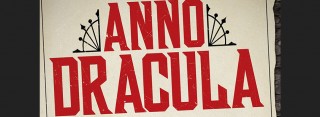

Review of Anno Dracula
This book kept me in it’s nocturnal thrall for the last two weeks, so I thought I’d share my high opinion.
I wondered; is it a bit late to review a vampire novel from 1992? Or, is it quite pertinent, given the rise of vampire themed books, films and TV shows?
Well, I’m going with the latter. I thought I’d share my impressions for others who, like me, are late to the Anno Dracula party.
Now, this book is fairly famous and if you haven’t read it, you’ve probably seen it on shelves or been recommended it. I was, many a time, but there was always something else higher in the list and I was put off by the vampire thing.
As I’ve said before, I’m not a huge vampire fan, for while I do like supernatural fantasy, I find them terribly overworked and often a thin framework for some mysterious sexy times. The allure of the vampire, the dark curse of the nocturnal world and all the rest of it are old hat.
But!
Anno Dracula is the remedy. If all the recent vampire trash has turned you off the genre, please try this book.
Now, I was not new to Kim Newman. I’d read his Warhammer book ‘Drachenfels’ which was written under the pseudonym of ‘Jack Yeovil’. That book features Geneviève Dieudonné, the principal in a very long list of fictional characters from other works that appear in Anno Dracula. That gave me the spur to give it a go, overriding the factor that originally put me off and may put off others:
The entire premise. A sequel to Dracula in which events took a different turn, Dracula escaped his hunters and went on to- brace yourself- marry Queen Victoria. ‘Cause he’s a Wallachian Prince (following with the school of thought of the big D being Vlad Tepes). So he marries Vicky and exposes vampirism to the world, then a series of characters nicked from other books get uppity about it and Jack Seward from Dracula becomes a vampire hunting version of Jack the Ripper. Pause for breath.
On the surface, it’s a godawful idea. It sounds absurd, trite, lazy and fan-fictiony. It sounds like a stoned conversation.
Well, stuff that, because it’s fantastic! You’ll be a few minutes into the book when you realise Kim’s genius. The random cameos, the bizarre alternate history and the whole vampire shtick flow seamlessly together to create a tongue-in-cheek masterpiece. Vampire fiction often suffers from taking itself too seriously, but the melodramatic Gothic setting is the perfect antidote to that.
Kim excels at managing the vampire elements of the story. He builds on the ‘traditional’ vampire of Stoker (whose missus appears in the story!) and all the ‘I vant to suck your blud’, brides-of-Dracula stuff while keeping a darker edge. For example: vampires turn other people, but that relationship isn’t always explored- it has emotional and social impact (especially in an era where the upper classes controlled much more of day-to-day life). Another example: Dracula could turn into a bat. But what if inexperienced vampires could make a mess of it and become twisted half-animals? There you have it- cheesy old school vampire clichés made ever so slightly more serious.
That’s pretty much how the rest of the setting goes. The vampirism, the Victorian era, the cameos from fictional and historical characters (there’s so many, I doubt I noticed them all); each brings a spoonful of fantasy adventure with an edge of brutality. The silliness of it all turns into outlandish penny dreadful theatre with teeth.
I can’t go into the plot without giving fun things away, but it’s great and well-paced. The writing is excellent, showing a masterful grasp of the era in terms of language, style and atmosphere. In fact, bring a thesaurus. The various characters Kim has brought together are each represented well; never over-exposed but hinted at with a clear admiration for the source. In many ways, it reminds me of how Neil Gaiman writes gods- they’re his versions, but they contain a grain of true understanding of the original character. Dracula himself is felt by his agency; his presence is in each of the new vampires, the state of the country and the reaction of those who oppose him. He’s present in every scene while hardly being mentioned at all.
I can’t say that Anno Dracula is flawless. At times you’d like a few more original characters, though the leads both shine. That’s Charles Beauregard and the practically original Geneviève, who are well rounded, developed and contrasted. There are also, for me, some issues with the ending. I don’t dislike it, I just wanted more! There are a lot of threads in this story that don’t come to fruition and it feels quite abrupt. I’m yet to read the sequels which should help, but being that it’s 30 years on, I fear that a lot will remain unsaid. I’m not sure where the line is between anti-climax and a story where the true finale is before the end, but I suppose I’m crying over spilt blood when you consider that there’s three more titles to enjoy.
There’s no shortage of vampire fiction and TV at the moment and a lot of it’s just designed to capitalise on the supposed mystery, danger and allure of the modern take on vampires. If you want to read something where vampirism is a vehicle for painting a satire of society and history that doesn’t take itself too seriously and yet has genuine emotional highs and lows… well, get this.
Incidentally, if you’re anything like me, you may find it distracting that Anno Dracula sounds a bit like ‘I know Dracula’ in a Yorkshire accent. Anno Dracula, ‘ee owes me ten bob.
